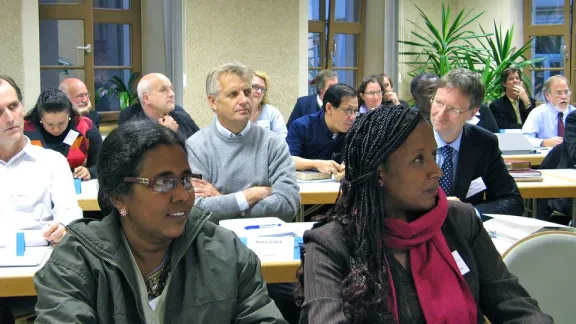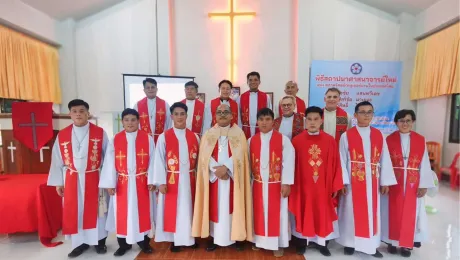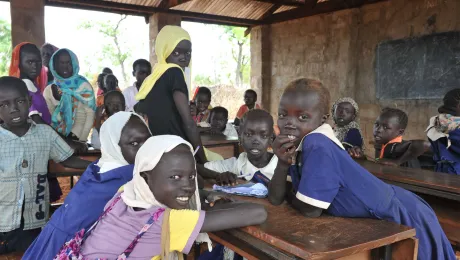
Participants at the LWF global consultation on theological education © LWF/Anli Serfontein
LWF Consultation Seeks Greater Focus on Ecumenism, Gender Studies and Inclusion of Lay People
Lutheran theological education should include more focus on ecumenism, give greater attention to gender studies and be inclusive of lay people, a global consultation of Lutheran theologians and educators heard in Wittenberg, Germany. Participants also urged that a practical component and the diversity of the global Lutheran communion should be reflected in the curricula taught at Lutheran educational institutions.
At the 18-22 October consultation in Wittenberg, Germany—the town where 16th century reformer Martin Luther lived and worked—the 50 delegates focused on the theme, “Secure foundations of the past and aspirations for the future: Lutheran Theological Education for Communion Building towards 2017.” The Lutheran World Federation (LWF) organized the event which was hosted by the Evangelical Church in Central Germany and the LWF German National Committee.
“People are in very different places—in some countries they have more traditional approaches, some are experimenting with new approaches, some are experimenting outside of the theological schools,“ Rev. Dr David Pfrimmer, Principal-Dean of Waterloo Lutheran Seminary in Canada told Lutheran World Information (LWI), reflecting on the consultation.
“Part of what you have to do is to see how you can make the tent big enough to include that type of diversity while maintaining the Lutheran traditions,” Pfrimmer continued.
One of the meeting’s goals was to find ways of strengthening Lutheran identity and to consider focus themes for the 500th Reformation anniversary in 2017.
“We should have more ecumenism and ecumenism should be included into the curriculum. It is very important for me. We live in an inter-religious society,” said Dr Mariette Razivelo from the Malagasy Lutheran Church.
Gender Emphasis
The issue of gender justice in theological education emerged as a strong theme. Razivelo said the consultation had helped “me a lot in the process of transforming the theological education. We are not an island anymore.” She expressed great appreciation for the meeting’s emphasis on gender.
Rev. Lilana Kasper from the Evangelical Lutheran Church in Southern Africa, and a member of the Female Theologians Forum of the sub-regional body Lutheran Communion in Southern Africa (LUCSA) said: “We are being empowered to go back and revive our teachings back home and look at what it means to be a Lutheran in today’s world.”
From the small group discussions reflecting the diversity of the seven LWF regions, strengthening networks and connecting with each other globally emerged as a strong desire among participants. It was agreed that possibilities of connecting electronically with each other should be further explored.
Delegates heard that in some regions like Latin America, the starting point for theological reflection is the everyday life of the Christian individuals and congregations. It was felt that this methodological approach should be taken seriously in the curricula.
Strategic Planning
Rev. Dr Dietrich Werner, World Council of Churches (WCC) program on Ecumenical Theological Education and co-editor of a WCC handbook on theological education, said that studies had shown that very few Christian theological institutions have a strategic plan for theological education.
Reporting back on a group discussion, Rev. Dr Hallgeir Elstad from the Church of Norway said, “We looked at the importance of education in our strategic thinking—how to design curriculums for the future and not curriculums that will be old fashioned tomorrow.”
Learning from each other’s experiences one group concluded that, “Lay people are very important. We don’t just need educated clergy, but also pastors that are educating.” Kaspers said LUCSA is developing a guide for lay leaders in the church and some of the topics discussed at the global consultation should be incorporated.
The challenge of combining theological education with practical skills was also highlighted. There is not a single “best way” forward, but a need to reflect on other cultures and adopt theological education to the local needs, one group noted.
“There are similarities but also many differences. There is a greater need for sustainability also in theological education. Our goals will not only be church in school, but also school in church,” Alexandra Battenberg from the Evangelical Church of the Augsburg Confession in Austria said.
“There is a sense of excitement about the future of theological education, but we are not quite sure what it would look like. But it is hopeful,” Pfrimmer concluded. (730 words)
(Written for LWI by Berlin-based journalist Anli Serfontein)


